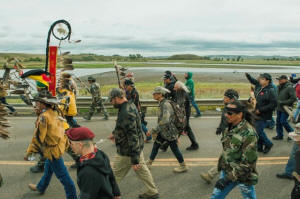|
After protests, U.S. halts North Dakota
pipeline near tribal lands
 Send a link to a friend
Send a link to a friend
 [September 10, 2016]
By Ruthy Munoz and Dave Thompson [September 10, 2016]
By Ruthy Munoz and Dave Thompson
WASHINGTON/BISMARCK, North Dakota (Reuters)
- The Obama administration stepped into a dispute on Friday over a
planned oil pipeline in North Dakota that has angered Native Americans,
appealing for calm while blocking construction on federal land and
asking the company behind the project to suspend work nearby.
The move came shortly after U.S. District Judge James Boasberg in
Washington rejected a request from Native Americans for a court order to
block the project. The government's action reflected the success of
growing protests over the proposed $3.7 billion pipeline crossing four
states which have sparked a renewal of Native American activism.
"This case has highlighted the need for a serious discussion on whether
there should be nationwide reform with respect to considering tribes'
views on these types of infrastructure projects," the U.S. Departments
of Justice, Army and Interior said in a joint statement released minutes
after Boasberg's ruling.
Opposition to the pipeline has drawn support from 200 Native American
tribes, as well as from activists and celebrities.
The Standing Rock Sioux, whose tribal lands are a half-mile south of the
proposed route, say the pipeline would desecrate sacred burial and
prayer sites, and could leak oil into the Missouri and Cannon Ball
rivers, on which the tribe relies for water.
On Friday, the tribe called the Obama administration's intervention
"stunning," saying it set the stage for nationwide reform on projects
affecting tribal lands.

“Our hearts are full, this an historic day for the Standing Rock Sioux
Tribe and for tribes across the nation,” tribal chairman Dave
Archambault II said in a statement. "Our voices have been heard."
In North Dakota's state capital of Bismarck, hundreds of protesters
celebrated the government decision.
“We won! We won!” Bobbi Jean Three Legs, a member of the Cheyenne River
Sioux of South Dakota, shouted to the cheering crowd.
Dakota Access, subsidiary of Energy Transfer Partners LP that is
building the pipeline, declined to comment. But an investor in the
pipeline project who asked not to be identified said officials were
trying to figure out what to do next.
IMPACT ON JOBS
A coalition of oil, business and labor entities from the states the
pipeline would cross said the halt could threaten the jobs of thousands
of workers.
"Should the Administration ultimately stop this construction, it would
set a horrific precedent," the Midwest Alliance for Infrastructure Now
said in a statement. "We hope and trust that the government will base
its final decision on sound science and engineering."
Thousands of people have swelled campgrounds near the site of the
proposed pipeline, drawing high-profile protesters like Green Party
presidential candidate Jill Stein and actress Shailene Woodley.
Last weekend, the protests turned violent as demonstrators breached a
wire fence and were confronted by security officers and guard dogs.
[to top of second column] |

Protesters demonstrate against the Energy Transfer Partners' Dakota
Access oil pipeline near the Standing Rock Sioux reservation in
Cannon Ball, North Dakota, U.S. September 9, 2016. REUTERS/Andrew
Cullen

After Boasberg said in his ruling that a decision by the U.S. Army
Corps of Engineers to fast-track the pipeline project was not
illegal, tribal leaders quickly filed a notice of appeal.
At the same time, however, government officials were promising to
temporarily halt construction of the pipeline on federally owned
land.
In their joint statement, the three departments said they would
invite Native American leaders to meetings this fall to discuss how
the federal government can better consider the tribes' views and
respect their land.
The departments also said they respected protesters' rights to
assemble and speak freely, and urged all sides to adhere to
principles of nonviolence.
The U.S. Army Corps of Engineers, which owns some of the land where
the pipeline was slated to be built and has been involved in the
permitting process, said it would halt construction on its property
until after officials had re-examined Native American concerns about
the pipeline as well as previous projects.
The government said it would not authorize construction on land at
Lake Oahe, a focal point of protests.
It called on Dakota Access to halt work on other land, as well. As
of late Friday, the company had not said whether it would comply.
When fully connected to existing lines, the 1,100-mile (1,770 km)
Dakota Access pipeline would be the first to carry crude oil from
the Bakken shale, a vast oil formation in North Dakota, Montana and
parts of Canada, directly to the U.S. Gulf.
It would carry oil from just north of land owned by the tribe to
Illinois, where it would connect with an existing pipeline.

In his ruling Boasberg said he could not concur with claims by the
Standing Rock Sioux that the government erred in approving the
Dakota Access pipeline.
(Additional reporting by Julia Harte in Washington, Catherine Ngai
in New York and Ben Klayman in Detroit; Writing by Sharon Bernstein;
Editing by Matthew Lewis and Mary Milliken)
[© 2016 Thomson Reuters. All rights
reserved.]
Copyright 2016 Reuters. All rights reserved. This material may not be published,
broadcast, rewritten or redistributed. |